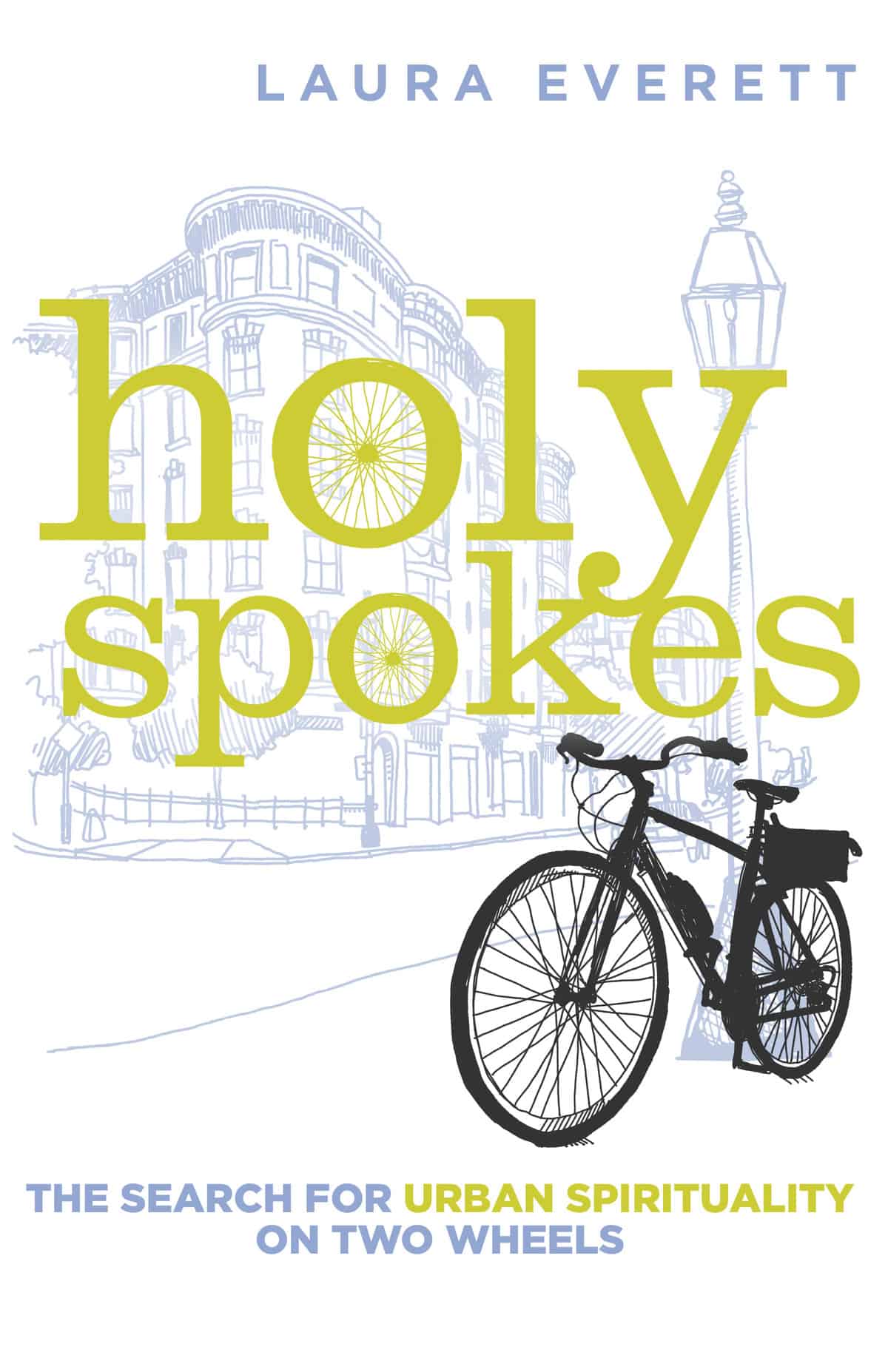
My husband bought me a new road bike for Mother’s Day last year. I’d been asking for one and he finally relented, though he knew purchasing a bike for me meant introducing all kinds of new ways he could worry about me, especially as the country roads around our small town are sometimes unkind to cyclists.
Assurances that I would always be cautious have only partially alleviated his concerns, and probably for good reason. Being on a lightweight road bike frame has made me feel more vulnerable in traffic than I ever have in my 20-some years of running on the very same roads. Cars seem to fly by at a faster rate and brush by more closely; hazards on the road seem more vivid and more dangerous; bridges seem higher, my place along their rails more precarious.
Riding a bike changes one’s relationship to the road, for sure.
Laura Everett does an excellent job of exploring this relationship in her engaging memoir, Holy Spokes: The Search for Urban Spirituality on Two Wheels. Using her day-to-day life as a cyclist in Boston as her narrative frame, Everett explores what might be termed a spirituality of cycling, considering the ways biking has transformed her relationship not only to the road, but also to her neighbors, to the different communities in Boston, to her vocation, and to God.
Holy Spokes is divided into twelve chapters, each of which examines one component of a complete bicycle: its frame, wheels, gears, brakes, etc. While this approach might seem artificial or forced, Everett seamlessly uses her contemplation of a bike’s necessary parts as a jumping-off point to considering aspects of her spiritual journey.
Everett seamlessly uses her contemplation of a bike’s necessary parts as a jumping-off point to considering aspects of her spiritual journey.
In the chapter on handlebars, for example, Everett describes the many kinds of handlebars and their usefulness for different environments, explaining how the flat bars of a mountain bike are distinct from the drop handlebars of a road bike, and why a bike messenger, weaving through inner city traffic, might prefer narrow flat bars to avoid getting hooked by passing cars.
Yet the chapter is so much more than an instructional guide to bike handlebars. In discussing the ways a bike’s steering system is adjusted for different environments, Everett also explores her own necessary adaptations in her life, in small and big ways, including the adaptations she makes following a bike accident, when she is hit by a car. (I will not be sharing that chapter with my husband, for sure!)
Everett’s frenetic charge through life is slowed by her injuries, as is her method of commuting. Necessary adjustments to her way of life following her accident allow her to see the ways adaptation is an important discipline, and she concludes that we all must meet the challenge in our spiritual lives to adjust when previous spiritual practices no longer work for us.
Similar adjustments are made to her cycling, and a new kind of handlebar—one that puts far less pressure on her back, injured in the accident—allows her to commute via bike once again. In ways big and small, Everett concludes, adaptation breathes new life into not only our practical, but also our spiritual, journeys.
Turning often to Brother Lawrence’s The Practice of the Presence of God, Everett finds religious instruction in the seemingly quotidian acts of each day. She notes that Brother Lawrence suggested we “think often” of God during the flotsam of each day, “in the daytime, at night, in all your occupations, in your exercises, and even during your time of amusement. God is always near you and with you.” For Everett, this thinking occurs while riding her bike; and thus, she says, cycling has made her “more faithful.”
Although biking provides Everett with exercise, her commitment to cycling is a lifestyle, too. She no longer owns a motor vehicle, and this intentional choice has also changed the way Everett relates to the communities she serves. Driving a car not only provides protection from the elements, but also allows us to move through neighborhoods essentially unaware of the people who dwell there; commuting by bike changes this dynamic. In one instance, Everett rides through a pool of blood left on the bike path and sees a child standing beside the path, crying and being comforted. She rides by without stopping, but her tires bear the stain of that event for a long time afterward, serving as a stark reminder of the ways our lives are intertwined, even with strangers whose stories we do not know, and will perhaps never know.
Our lives are intertwined, even with strangers whose stories we do not know.
Like Brother Lawrence, working in the Carmelite kitchen, Everett’s cycling seems like an extension of her ministry, so much so that her current bike (she has owned several) is labeled the ClergyBike. Although Everett serves a United Church of Christ congregation, her vocation takes her away from the church, too, where on a bike she is “visible and recognizable out on the road,” rather than cloistered in a building, where she feels her reach would be far less extensive.
Everett’s book is strongest when she narrates the human interactions she has, tying her own particular bike culture to our universal humanity and allowing us to connect with her experience whether we ride a bike to commute, only to exercise, or not at all. Although she cautions against believing that Bostonians’ experience of their city is a monolith, given socioeconomic difference, her book is tied together by our shared sense of life, of grief and joy, darkness and light.
At times Everett geeks out about cycling, and while I found this information about biking’s history and culture interesting, readers who are entirely outside cycling culture might not be as interested. And still, Everett always re-centers our perspective through another fascinating observation of her life on the road, one that shows so clearly the ways we are called to our own spiritual disciplines—no matter whether they be like Brother Lawrence, working in a kitchen; or like Everett, riding through Boston; or like me, just learning how to clip my shoes into bike pedals, and hoping not to fall.
In this I am especially grateful for Everett’s work. I probably won’t ever be a biking commuter—I’m too intimidated by riding in Oregon’s ever-present rain. Still, Holy Spokes challenges me to converse with God in my own day-to-day practices, to find joy in what I do, and to pay attention to the pathway I’m on, both literally and figuratively.
Melanie Springer Mock is a Professor of English at George Fox University, Newberg, Oregon. She is also the author or co-author of four books including, most recently, If Eve Only Knew: Freeing Yourself from Biblical Womanhood and Becoming All God Means for You to Be (Chalice Press, 2015); a fifth book is forthcoming from Herald Press. Her essays and reviews have appeared in The Nation, Christianity Today, The Chronicle of Higher Education, and Mennonite World Review, among other places.

